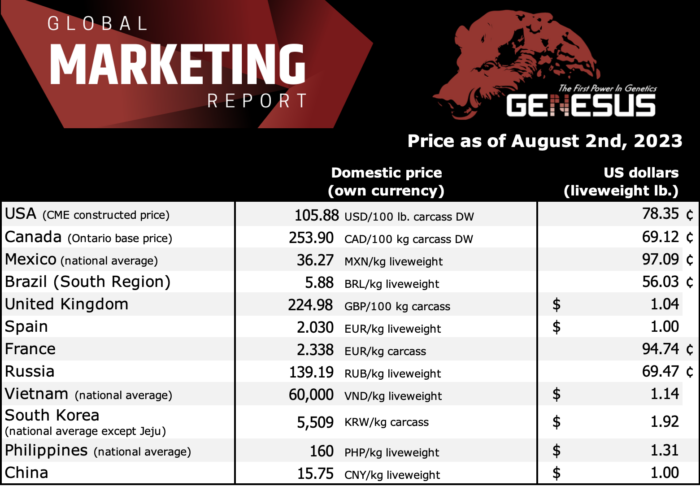Spencer Long of Genesus

The summer months have not brought much happiness to the Canadian industry. Costs are still high, and prices have improved for producers for now but the futures are not looking favorable. The reality of months upon months of massive losses for so many is beyond devastating. Olymel which is one of the largest processors in Canada has announced plant closures as well as internal production barn closures over the last number of months. The reality of this industry is it’s hurting everyone currently. With losses having mounted it begs the question of what this industry could be doing differently. Flatline pork consumption for 20+ years leads one to wonder if what we’re producing isn’t what consumers desire. If one was to look at pork as one of the cheapest proteins available to Canadians right now and there is the potential to grow the domestic market among consumers who are trying to stretch their dollar in a high-inflation environment, why aren’t prices going up more because of increased demand? Maybe the reality is more consumers aren’t switching to pork as what we’re providing consumers isn’t a product they desire. When consumer studies have shown countless times that taste is the number one factor in determining if a person purchases a product or not it would be a good idea as an industry to focus on that. We get so caught up on tiki-tack stuff like sustainability when in reality taste is far more important in determining what a person purchases. What we’re doing as an industry isn’t working, it’s beyond time to actually focus on what’s important, taste.
The positive start to the crop outlook back in May has deteriorated across much of the prairies. Projections had shown that this was going to be the second largest wheat crop in Canadian history, now that will not be the case. The U.S. Department of Agriculture pegged Canada’s wheat production at 35 million tonnes in its July report, down five percent from its June estimate because of reduced yields. 45 percent of Alberta’s crops were rated good to excellent, according to the July 14 Alberta crop report which is below the five-year average of 66 percent and the 10-year average of 68 percent. The drought that has been affecting the prairies this summer has not been as devastating as the one faced in 2021 as of yet and hopefully, it improves through August.
In other news, Canada has a new Minister of Agriculture, Lawrence MacAulay returns to the job after being out of it for four years. He can start by looking at the United Kingdom’s accession to the Comprehensive and Progressive Agreement for Trans-Pacific Partnership (CPTPP) which will not allow fair trade between Canada and the UK in pork. The UK does not accept Canada’s food safety and animal health systems and measures, and those non-tariff barriers limit Canada’s access to the UK market. This deal isn’t fair to the Canadian industry and harms the relationship Canada has with the UK. The hope is this new Minister of Agriculture will defend and champion the Canadian industry as our Prime Minister has done anything but that. Our always brilliant Prime Minister shuffled his cabinet again as he slowly comes to the realization that most people in Canada more or less despise him besides the elitist people in Toronto and Montreal who actually like him. It’s a great system we have in Canada where you can lose the popular vote two times in a row, 67% of the country votes against you, and still get re-elected both times.
Below link to an interview, I did at the 2023 World Pork Expo with Swineweb:
Sources:
https://calgaryherald.com/business/local-business/alberta-pork-producers-major-losses-closures
https://www.cpc-ccp.com/file.aspx?id=b3506893-8586-4ace-9c87-e1c9a2387966
https://www.producer.com/news/prairie-crops-in-trouble-2/
https://www.taste-institute.com/en/resources/blog/importance-of-taste-in-product-development
Categorised in: Featured News, Global Markets
This post was written by Genesus



